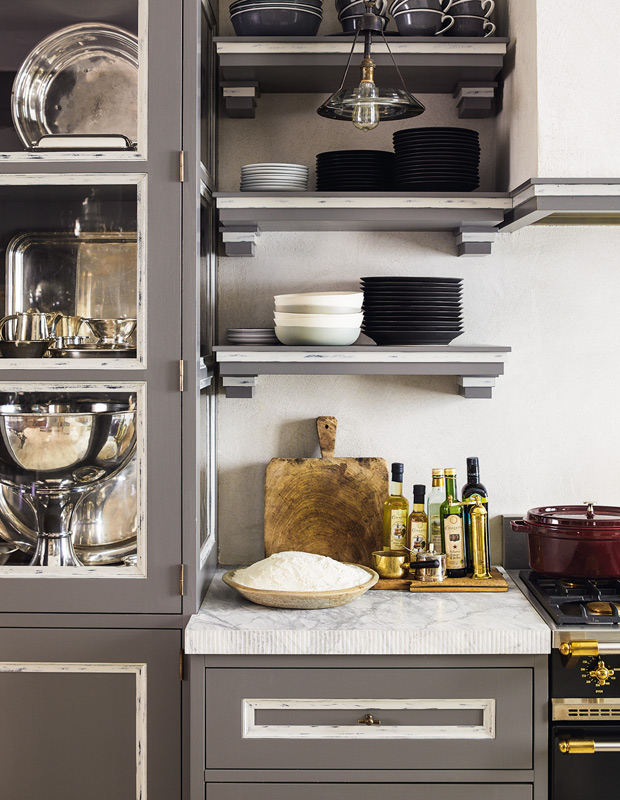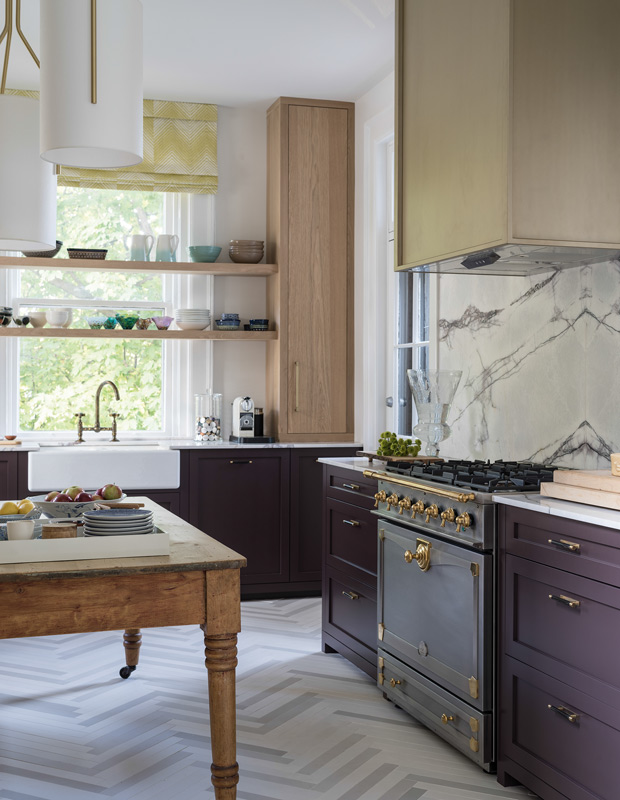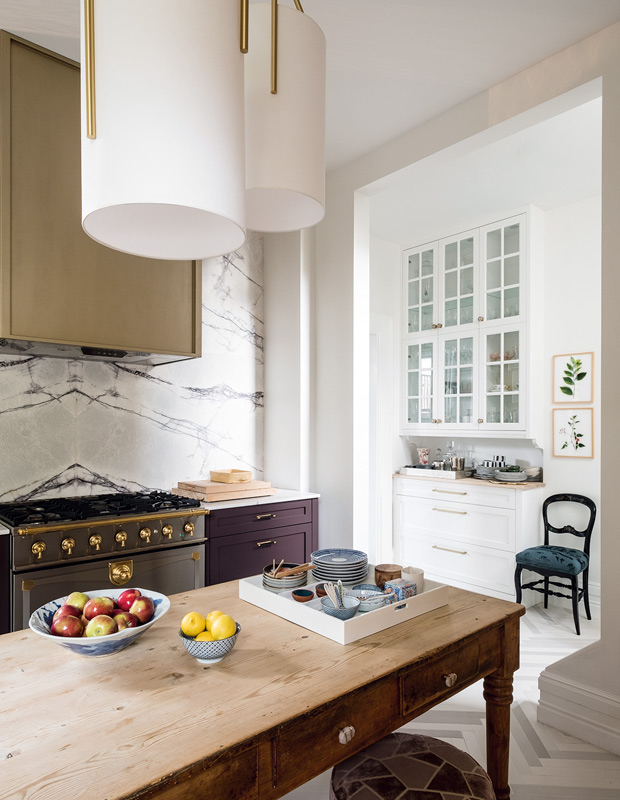Decorating & Design
January 9, 2020
Lynda Reeves On The New Recipe For Kitchen Design

This article originally appeared in the October 2019 issue of House & Home
Kitchen design has a way of bringing out strong opinions in many of us. Everyone has their view on exactly what they don’t like, plus a list of things they’re considering but wonder about. The investment is always big and the results permanent, so deciding what materials to use is especially critical in a kitchen renovation
Inevitably, the kitchens I gravitate to are handsome, with some classic detailing, heavy polished hardware, some feature appliances like a great range, a mix of painted and natural wood cabinets and always counters and backsplashes of natural stone — soapstone, granite, slate or marble — plus oiled or varnished woods.
For the longest time, I’ve only ever considered real marble with a honed or half-honed finish for my own kitchen designs. Believing that imperfections and the inevitable scratches and stains would only enhance the patina of honed marble counters, I wouldn’t even consider a man-made alternative. But then, I also thought that jeans had to be 100 percent cotton denim with no synthetic mix, and only pure linen pants would do, no matter how much better a little bit of Lycra could make them fit.
I’ve totally changed my tune, just in time to avoid a dinosaur designation, because not seeing the huge advantages of today’s alternative materials would be crazy. Engineered stone is any man-made material that mimics stone. It includes brand names such as Caesarstone and Silestone, both manufactured from quartz and resin. The advantage to these surfaces is that they aren’t porous so they don’t absorb liquid, they don’t stain and rarely scratch, and they come in a huge number of great finishes with a wide range of textures and colors, including subtle shades from nature. You can create a larger surface with no seams than you can using natural stone. Even the biggest real marble slabs won’t cover a whole kitchen without multiple seams.
The granddaddy of all composite solid surfaces is Corian, DuPont’s brand name for its groundbreaking material that debuted in 1971, which is now offered in more than 100 colors and can be installed to look virtually seamless.
Dekton, which is Cosentino’s sophisticated new blend of glass, porcelain and quartz, offers the ability to produce a seamless surface of any size that has zero porosity, is heatproof and comes in a wide range of colors and finishes.
If you’re building a new kitchen and can’t give up on the beauty and tactile feel of the real thing, consider using a mix of both natural stone, wood and engineered materials for what is perhaps the perfect marriage. Mixing materials in a curated way is the number one trend I’m seeing in the best kitchens around. I’ve picked two that are my current inspirations for my own kitchen refresh (stay tuned!), and both fit the bill of being handsome, tactile and bespoke-looking, with mixed materials and touches of old world elegance. I love the feeling that these could be kitchens in a grand house, even if the butler is actually only me.

“Grand Casual” is still my favorite decorating style, and it’s especially on show in these fabulous rooms. The first is the townhouse kitchen in the former home of New York designer Steven Gambrel (top and above). You can see that it’s partially below ground with steps that lead up to the garden. It’s a subtle mix of salvaged architectural antiques and materials, such as the marble-slab stone floor, vintage marble work table and the marble farmhouse sink with antique brass faucets and handles retrofitted with new interior parts. Notice the extra-tall backsplash behind the sink, and the way the sink is tucked into a corner and the faucet is side-mounted.

Next is the Westmount, Quebec, kitchen in the home of Montreal designers Maxime Vandal and Richard Ouellette. It’s such an uplifting room with huge charm and plenty of display space against a window wall so their collection of handmade bowls and dishes are backlit. Lovers of natural stone, yes, but the designers chose ceramic floor tile from Stone Tile, laid in a herringbone pattern, for its beauty and durability. The wall behind the range is clad in natural marble called Turkish Lilac, and the upper cabinets are oak with a linen hand finish, which means they have the texture of weathered oak. Notice the mix of metals, including the matte gold finish on the custom range hood. It’s interesting to note that both kitchens feature vintage tables in place of new islands and painted cabinets in their mix.

Keep these things in mind when having a kitchen remodeling project. Kitchens, because they’re permanent installations of craftsmanship, are the best place in your home to experiment with different textures, finishes, hardware and architectural details. Choose which appliances you want to feature on full display, and which ones will be hidden behind custom panels or tucked into an island. Experiment with paint colors and playful light fixtures. Find your own perfect recipe for a joyful kitchen. You may never go back to what you thought you had to have. I can’t imagine life without stretchy jeans. Can you?
Eric Piasecki, Otto (Steven Gambrel's kitchen), André Rider (Les Ensembliers' kitchen)
House & Home October 2019
Steven Gambrel (first kitchen), Les Ensembliers (second kitchen)

